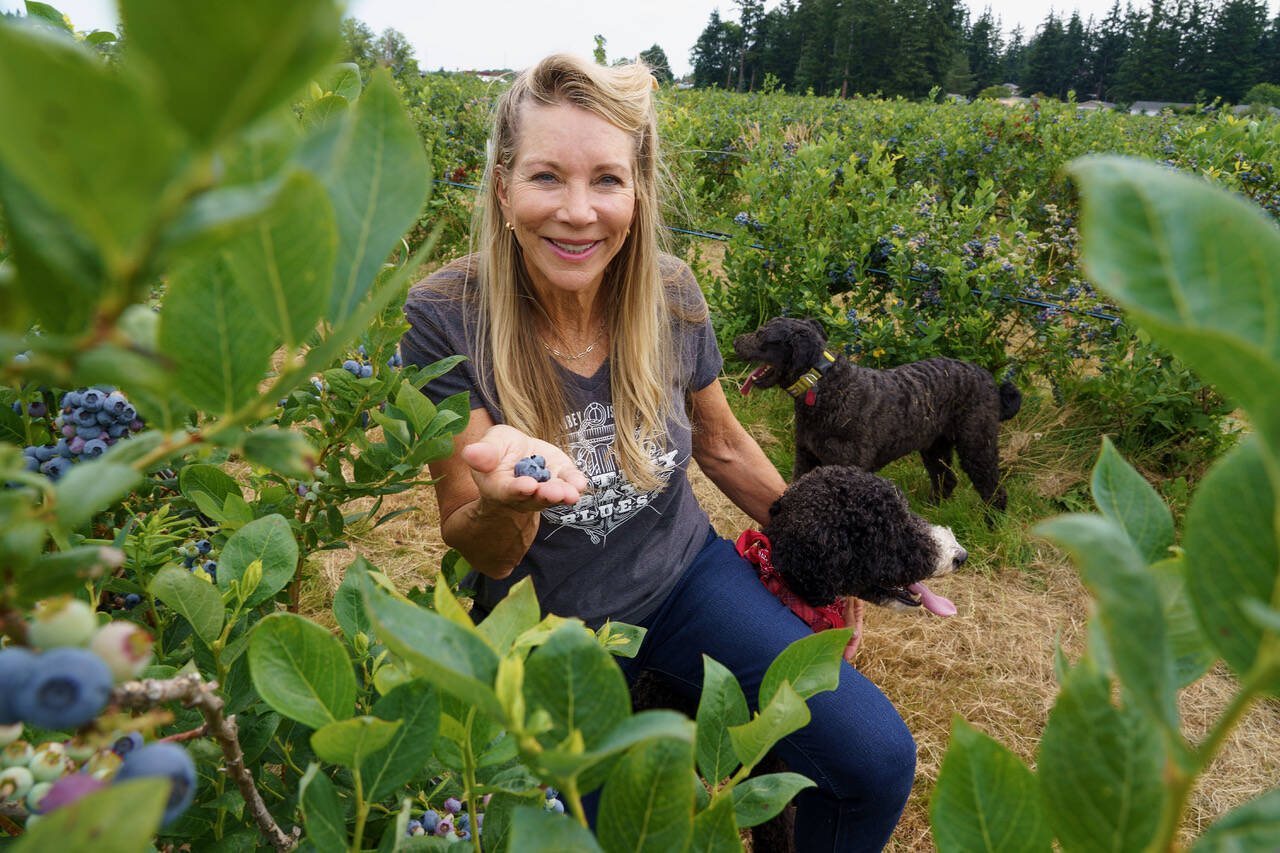Just a few days away from the opening season, South Whidbey’s most-anticipated berries have begun to ripen.
Year after year, customers line up by the carful to get a taste of the blueberries grown by Mutiny Bay Blues, the Fletcher family farm in Freeland.
“They’ll park and they’ll just start running,” Britt Fletcher said. “For a fruit stand? It’s crazy.”
This summer marks the 10th anniversary of the first growing season for Mutiny Bay Blues. The first bushes were planted in 2011 but didn’t mature until 2014.
Britt purchased the former potato, wheat and barley farm with wife Linda in 2001 and began farming a decade later following a 30-year career as a media investment banker on Wall Street. A berry picker from the age of 9, Britt found himself eager to return to his Pacific Northwest roots.
“Given I grew up in Puyallup, it was kind of a round trip for me,” he said. “This is more of my passion thing. You’re pushing paper when you’re on Wall Street and making phone calls and all that. Here you actually have something tangible. You really feel you provide jobs for people, you’re feeding people. It’s my favorite thing.”
Linda’s family has an extensive background in farming, going back to her great-grandfather, which makes the couple’s granddaughter a sixth-generation farmer.
Britt and Linda are joined by kids Lauren and Kai in the organic blueberry operation, which produces between 80,000 and 100,000 pounds of the tasty little berry every year. The six-week season – usually from mid-July to Labor Day – yields four different varieties which differ slightly in flavor profile.
“We have different customers,” Britt said. “Some love a little tart – and I personally love a little tart – but most like them to be a little sweeter.”
Within the next few years, Mutiny Bay Blues expects to have a new and unique variety of berry known as hardy kiwi available. The grape-sized fruit is a bite-sized kiwi that requires no peeling.
About 30% of the crops are eaten by birds. Dogs, lasers, cannon booms and kids on ATVs have all been used to scare them away, but sky puppets – colorful inflatable tube creatures commonly seen at car dealerships – are most effective because of their erratic movement, Kai said.
Pickers have become increasingly harder to find throughout the years, even with an enticing starting wage of $19 an hour. Though modern farming equipment has mechanized some of the hardest work of picking, employees are still needed to run it, and also in the processing line and at the farm stand.
The farm stand located on 5486 Cameron Road – visible from Highway 525 – officially opens at 9 a.m. this Thursday, July 25.
But berries aren’t the only focus of the family farm. Over the past year, the Fletchers have started planting hay, growing mushrooms and raising chickens for eggs.
This year, they planted a mixture of alfalfa, timothy, fescue and orchard grass that makes hay for horses and cows. A year-round honesty stand across from Jupiter Coffee sells farm-fresh eggs and mushrooms.
Inside a well-ventilated fruiting room, oyster, pioppino, lion’s mane and occasionally shiitake mushrooms sprout from a substrate of wood and soy.
And out in the fields, a mobile chicken coop run by solar power allows the egg-layers to graze and fertilize. Because the coop is on the move every other day, coyotes don’t have a chance to start digging under it.
A solar panel controls the distribution of chicken feed, opens and closes the doors automatically and provides light in the winter.
“We try to do solar as much as possible,” Britt said.
Earlier this year, on Earth Day, Mutiny Bay Blues was awarded a $78,800 grant from USDA to purchase and install an 88.2-kilowatt solar array.
In the summertime, solar energy covers 100% of the farm’s electrical usage, including lights, coolers and refrigeration systems.
For those interested in getting a more up-close-and-personal view of operations, Mutiny Bay Blues plans to host a farm tour over Labor Day weekend.



